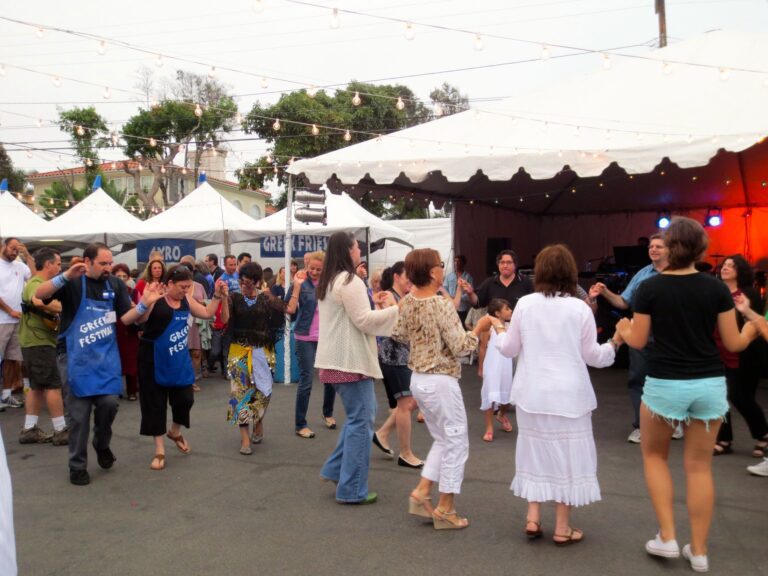by Sofia Williams
The smells of Gyro, Souvlaki and Paidakia greeted me with a delicious smell as I approached St. Katherine Greek Orthodox Church on a foggy Saturday afternoon for its annual South Bay Greek Festival.
The event, which took place Friday through Sunday in Redondo Beach, included Greek music, traditional Greek foods, religious lectures and tours of St. Katherine Church. Live music was provided by local artists such as the Olympians and DJ Peter Loukatos.
In addition to food items, stalls sold books, icons and raffle tickets. Every two hours, Demetrios Wilson would give a tour of the church and each hour a new lecture would begin on a different religious topic. At 5 p.m. on Saturday and Sunday, young church members performed Greek folk dances in a spacious courtyard marked off by tables.
Dr. James Dimitriou, president of the American Hellenic Council and board member of the Greek Heritage Society of Southern California, is an active member of the South Bay Greek community. The South Bay Greek Festival was the first of its kind in the greater Los Angeles area when it began in 1963, according to Dimitriou.
“The idea was that we had a culture that we wanted to share with everyone,” Dimitriou said. “We have Greek filotimoor welcoming guests, and we wanted to share this concept that we have adopted here. Filotime was the concept the whole festival was based on. After he started doing this, all the churches in the Los Angeles area began hosting festivals for the community.
All food sold at the festival is prepared in St. Katherine’s commercial kitchen by a team of volunteers. According to volunteer Peter Lagios, festival staff begin preparations months in advance, working to provide large quantities of food and drinks to festival patrons.
Dimitriou says the first step in planning the festival is to decide on a date that does not conflict with other Greek festivals in the area. Secondly, adds Dimitriou, you have to decide on the cuisine. Although the festival “will still offer Gyros, Souvlaki (kebabs) and Loukoumades (hot donuts),” Dimitriou says, “everything else is built around those staples.”
According to Lagios, the festival is an important way for people to meet, socialize and connect with an ancient culture that has remained relatively unchanged in the face of modern trends.
“(Sharing culture) has been part of Greece since ancient times; cultivating understanding that prevents hostility and (allows people to) work together has been part of Greek culture from the very beginning. This is why it lasted 3000 years. From the 7,000 Greek islands to the top of the Acropolis, you will feel this everywhere you go,” said Dimitriou.
A Model United Nations teacher at Peninsula High School, Dimitrou strongly believes in the importance of preserving and sharing Greek culture and passes this belief on to his students. Dimitriou has made over 20 trips to Greece with over 5,000 students and sees many of them attend the South Bay Greek Festival year after year.
“(Participating in the festival) does not mean that you are Greek, it just means that you like to share hospitality, that Filotime idea,” Dimitriou said. “I think it’s the most important thing we have, and I think it’s what people remember.” emergency


